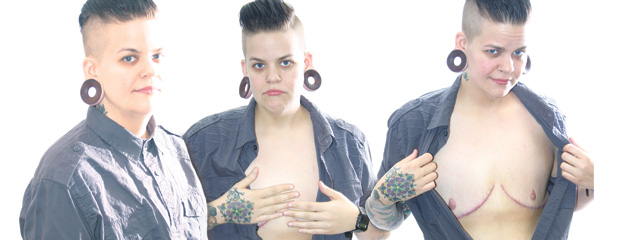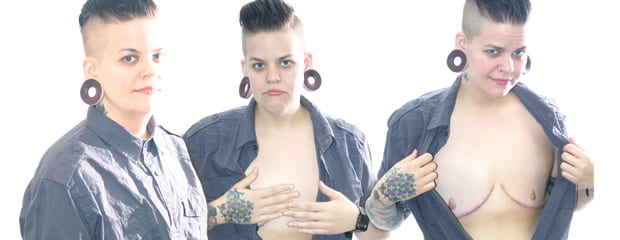Trans man’s treatment prompts changes in Parkland policies

THE RIGHT CHOICE | Maddox Price said having top surgery was the best decision he’s ever made. (David Taffet/Dallas Voice)
When Maddox Price’s former girlfriend read his Facebook post that sounded like he was saying goodbye to friends after finishing off a bottle of pills, she called police.
Police had Price transported to the psych unit at Parkland Memorial Hospital, where he got what he described as the kind of care “that would lead people to kill themselves.” Price, a transgender man, reported suffering from increasing depression over the month prior to the incident, even though he was elated about having had top surgery just nine days earlier in San Antonio.
He hasn’t changed his gender marker on legal papers and is just beginning therapy with a gender therapist, even though he’s already had top surgery.
While he complained about his treatment at Parkland and by police, Price said he is glad that his complaints were taken seriously and changes have been made to make things better for him and other trans people who use the hospital.
Price said the problems began with officers who first took him into custody. He said he asked not to be handcuffed behind his back because he was still healing from the surgery. He said officers did agree to use a looser cuff, but still placed his hands behind his back.
Dallas Police Department’s LGBT Liaison Laura Martin said DPD procedure when someone is taken into custody is to cuff their hands behind their backs unless paramedics say not to.
Price said he was stressed over the break up with his ex, under pressure at school where he is editor-in-chief of the Brookhaven College newspaper and still healing from surgery, alone at home.
“I knew they had to take me,” he said. “I had an empty pill bottle next to my bed.”
But Price said he had simply finished the prescription of hydrocodone, prescribed after the surgery. None of the medical records from Parkland or Green Oaks Hospital, where Price was transferred, contradict this.
Price said he was well cared for at Parkland’s emergency room.
“They were respectful,” he said. “I was on suicide watch, but they gave me my medication and changed the bandages.”
After being treated in the ER, he was moved to the psych department. “That,” he said, “is where the problems happened.”
According to his medical records, Price kept getting agitated. Price said he was just insisting that staff there recognize and respect his gender identity.
“Their treatment of gender-variant people needed to change,” he said. “I asked why my gender identity wasn’t being respected.”
Parkland spokeswoman April Foran said Price’s issues have been fully addressed.
“As an organization that has been recognized as a leader in LGBT healthcare equality in the Healthcare Equality Index, we are committed to being inclusive of all individuals,” Foran said.
Parkland received a perfect score on Human Right’s Campaign’s new Healthcare Equality Index that rates hospitals in a publication similar to the Corporate Equality Index.
“Psychiatric Services leadership developed a cultural competency module designed for working with members of the LGBT community,” Foran said.
Price questioned how his gender identity was recognized. He said he understood why the hospital and police needed his legal name. He even said he understood if other departments in the hospital only used his legal name, since neither his name nor the gender markers on his identification and legal papers have been changed.
But he said he thought staff in the psychiatric unit should understand gender variance better. Rather than cause further upset to a patient already in a stressed out and upset state, Price said he thought hospital personnel should use his preferred name. To him, that is no different than a person who’s always been called by a nickname not answering when called by his legal name.
“As a measure to ensure safety, all hospitals use two patient identifiers when interacting with patients,” Foran explained. “Parkland is no different.
However, we recognize the importance of developing positive relationships with patients by using their preferred name designated by a patient, rather than the name a patient used as registration.
“When our patients express the desire to be addressed by a name other than their legal name, our staff will use the preferred name,” Foran said. “When the encounter does require two patient identifiers, one of them is the name on the patient’s registration.”
Price said he started menstruating while he was at the hospital. When he asked for a tampon, a nurse said they only had pads. Price refused to take one. He said as a trans man, he dislikes using pads.
“It’s a trigger for me,” Price said.
The fix for that was simple.
“Tampons are [now] available in the psychiatric units,” Foran said.
Another change has also happened to make Parkland more welcoming to trans patients.
“Parkland has re-designated bathrooms as unisex and assured that our patient visitation rights language includes gender identity,” Foran said.
In addition to the changes at Parkland in response to Price’s complaints, Martin has said that his complaints about his treatment by police have been addressed privately, despite a letter that said Price filed the complaint beyond the 60-day limit to trigger an investigation.
While Price’s medical records indicate that medical staff at Parkland — and at Green Oaks where he stayed later — had some misgivings about Price’s top surgery, questioning whether that surgery might have contributed to his depression, Price said he’s delighted with the result.
“It’s the best decision I’ve ever made,” he said. “My life is changed — in the best way.”
This article appeared in the Dallas Voice print edition August 8, 2014.

